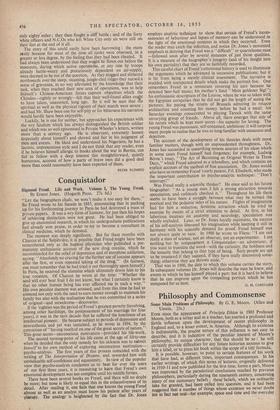. The Cruel Jungle
The March Out. By James Shaw. (Hart-Davis. 12s. 6d.) COLONEL BERNARD FERGUSSON, in his very sensible introduction, computes that this is the twelfth book to be published about the Chindits ; " this seems," he observes, " a lot of printer's ink to be expended on two comparatively minor campaigns." I confess that I did not expect to find much that was new in either the matter or the manner of The March Out, and was agreeably surprised when it turned out to be the sort of book that you practically cannot put down until you have finished it.
As an ex-regular soldier, Mr. Shaw should have known better than to volunteer for anything ; but he volunteered for Special Force (as Wingate's command was called) when he was forty years old; and, with a draft of West African reinforcements and a cargo of Dannert wire, was duly deposited on an air-strip in the middle of enemy-occupied Burma. Mr. Shaw was a sergeant serving with the 12th Battalion the Nigeria Regiment. The role oNhe West African forces committed to this campaign was, in conception at any rate, that of garrison troops ; they were to man the permanent defences of the strongholds from which more mobile and aggressive columns —British and Gurkha—would prob6 the soft under-belly of the Imperial Army's administrative areas. But the advance of Fourteenth army across the Chindwin was forestalled by an impetuous move in the opposite direction by three Japanese divisions and although these, in the end, met with disaster before lmphal, Wingate's forces, powerfully weakened by their leader's death, found themselves involved in a sideshow no longer directly related to our main strategy.
One of the consequences of this was that the Chindits' strongholds became untenable • and at White City—in its day the most for- midable of them—Mr. Shaw's battalion was Tail End Charlie and had the unenviable job of staying for a time behind and making the enemy believe that the jagged little cluster of hillocks was still fully manned. Succeeding—admittedly against gullible and unenterprising opponents—in their bluff, they moved north through the jungle after the other columns, to undergo as severe a test of endurance as infantry have ever been put to in the history of war. In three months of almost continuous marching (and wading) they covered only eightymiles-' they then fought a stiff battle ; and of the forty white officers and N.C.Os who left White City only six were still on their feet at the end of it all.
The story of this could easily have been harrowing : the more cosily because for most of the time all ranks were obsessed, in a greater or less degree, by the feeling that they had been cheated. It had always been understood that they would be flown out before the monsoon, during which active operations, at any rate by troops already battle-weary and precariously dependent on air-supply, were deemed to be out of the question. As they slogged and slithered northwards over the steep, steaming, jungle-clad ridges they nursed a sense of grievance, in no way alleviated by the knowledge that their task, when they reached their new area of operations, was to help Stilwell's Chinese-American forces capture objectives which the Chindits—rightly or wrongly—felt that their well-found allies ought to have taken, unassisted, long ago. So it will be seen that the spiritual as well as the physical rigours of their march were severe ; and had Mr. Shaw been one for self-pity or for bitterness his narrative would hardly have been enjoyable.
Luckily, he is one for neither, but approaches his experiences with the wry fatalism which has always distinguished the British soldier and which was so well epitomised in Private Wheeler's letters, written more than a century ago. He is observant, extremely honest (especially about himself) and shrewd and fair in his judgment of men and events. He liked and understood his Nigerians, he has a laconic, unpretentious style and I do not think that any reader, even if he believes himself allergic to books about the war in Burma, can fail to follow with a deep interest this straightforward, quietly humorous, account of how a party of brave men did a good deal more than could reasonably have been expected of them.
PETER FLEMING



































 Previous page
Previous page